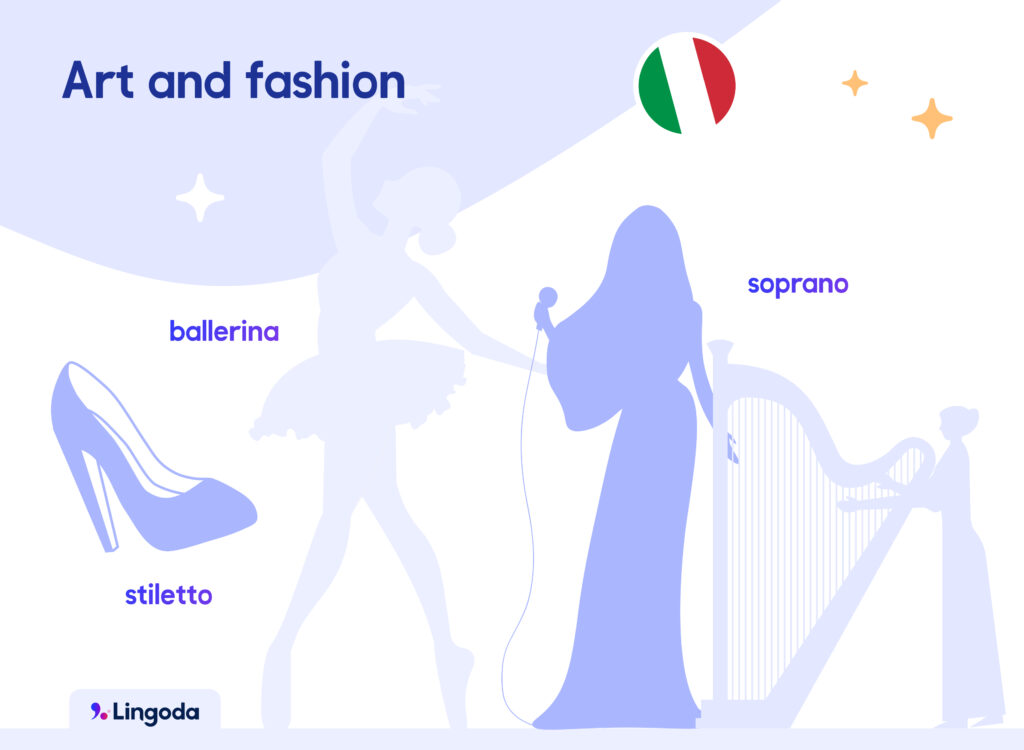Updated on March 21, 2025

38 Italian words commonly used in English
Italian words have a way of waltzing their way into the English language, often without us even noticing. From delicious foods (pasta, anyone?) to musical terms like concerto and soprano, Italian words are everywhere in English. You may not even notice it, as these words have seamlessly integrated into the standard English lexicon, adding a touch of sophistication along the way.

But not all is quite as it seems. Much of the Italian vocabulary used in English has changed in meaning and pronunciation over the course of its linguistic migration — and these changes can leave a native Italian scratching their head.
In this article, we’ll explore some of the Italian words that have become everyday English staples. But we won’t take all of these words at face value. On the contrary, we’ll uncover the truth behind some of the most commonly misunderstood terms so that you can pepper your next Italian-inspired conversation with exactly the right amount of flavor and flair.
- A brief history of Italian words in the English language
- Top 38 Italian words commonly used in English
- Plurals, misinterpretations and mistakes
- Italian phrases adopted into English
- New borrowings and trends
- Tips for using Italian words correctly in English
- FAQs
A brief history of Italian words in the English language
The Renaissance influence
During the Renaissance, a cultural blooming that took place between the 14th and 16th centuries, Italy wasn’t just home to pasta and pizza. It was a beacon of cultural, artistic and intellectual innovation.
As English-speaking artists and intellectuals sought inspiration from the flourishing cities of Florence and Venice, they eagerly adopted Italian terms to describe the newfound wonders they encountered. Words like opera, sonata and fresco made their way into English, often to describe artistic techniques or concepts that had no direct equivalents in the English-speaking world.
The Italian influence was so strong that even English monarchs like Henry VIII couldn’t resist embracing Renaissance culture. In any case, it wasn’t long before Italian words transcended academia and flowed out into everyday speech, making their mark on the English lexicon for centuries to come.
Italy’s global influence through food, art and fashion
Fast forward to today, and Italy’s influence remains as vibrant as ever. Italian food is so ingrained in the English-speaking world that spaghetti is seen as more of a universal comfort food than as a strictly Italian export.
But it’s not just about pasta — Italy is also synonymous with luxury and style. Terms lifted from Italian high fashion, architecture and design pepper English conversations, largely thanks to Italy’s dominance in these fields. Whether you’re savoring a gelato on the veranda or admiring a pair of stiletto heels, Italy’s influence pervades not just the culinary scene, but the way we think about beauty and craftsmanship.
Top 38 Italian words commonly used in English
Food and drink

| Word | Notes |
| pizza | The plural in Italian is pizze, not pizzas. |
| pasta | It means “dough.” |
| espresso | Italians just call it caffè. |
| tiramisù | This dessert’s name literally translates to “pick me up.” |
| gelato | It means “frozen.” |
| panini | Plural for panino, it simply means “sandwich.” |
| focaccia | This bread is typically eaten on its own in Italy. |
| risotto | Originally, Italian risotto was always spiced with saffron. |
| cappuccino | Originally, cacao sprinkles were used only to cover the taste of a bad froth. |
| antipasti | Anti = before, pasto = meal. |
| balsamic | It’s meant to be curative, derived from the Ancient Greek balsamon.. |
| mozzarella | Originally, this word described hand-pulled and cut (mozzare) curds. |
| prosciutto | Etruscan tribes prepared it as early as 900 BC. |
| salami | It derives from the Latin salame (literally, “to salt the meat”). |
| pesto | It means “crushed,” as its ingredients are simply ground together. |
| ravioli | This pasta was originally served with broth. |
| bistecca | This word inspired the English word “steak.” |
| limoncello | Apparently this liqueur was first developed by nuns. |
| latte | Remember to order a caffè latte, or you’ll get only a glass of milk! |

Learn Italian with Lingoda
How it works

Art, music and fashion

| Word | Notes |
| opera | Opera originated in 16th-century Florence. |
| sonata | This noun comes from the Italian verb sonare (to sound). |
| fresco | ONo solvents, glues or manmade materials are used in this classical painting method. |
| ballerina | This noun comes from the Italian verb ballare (to dance). |
| soprano | This name for the highest vocal range comes fromthe verb sopra (above). |
| allegro | Literally, “happy” or “lively.” |
| adagio | This word means “at ease” and describes a tempo close to that of a heartbeat. |
| galleria | Originally meaning “church porch,” galleria only later became the term for a passage with shops and vendors. |
| fugue | From the Latin “flight” or “escape.” It may also have French influences. |
| crescendo | Literally, “growing” or “increasing.” |
| graffiti | This ubiquitous word for street art comes from graffio (scratch). |
| stiletto | Originally a stiletto was a needle-pointed weapon, though it’s now a particularly dramatic style of high-heel shoe. |
Everyday words you didn’t know were Italian

| Word | Notes |
| fiasco | Literally “flask,” this word is often used to describe a complete failure. |
| bravo | Meaning “brave,” this word is used in English to praise a good performer. |
| ghetto | This is a slang term in Italian for borghetto (small borough). |
| confetti | “Confected” sweets were often thrown during carnivals in Italy. |
| scenario | This is the “stage” where a play or film is set. |
| panorama | English didn’t have a word for “unobstructed view,” so it borrowed from the Italian. |
| agenda | From the Italian word for “schedule.” |
| casino | Literally “small house,” as this is where the first gambling venues were located. |
What our students of Italian say
Plurals, misinterpretations and mistakes
Italian words in English can often lead to mistakes in pronunciation and confusion in meaning.
One of the most frequent mistakes involves the confusion between singular and plural forms. Take panini, for example. While it’s often used in English to mean a single sandwich, it’s actually the plural of panino in Italian. So, if you’re in Italy and ask for a panini expecting one sandwich, you might be met with a puzzled look. Similarly, zucchini is the plural form of zucchino.
Another classic misinterpretation is the case of pepperoni. In English, we use this word to describe a specific type of spicy sausage, usually on pizza. However, in Italy, peperoni means “bell peppers.” So, if you ask for a peperoni pizza in Italy, you’ll get a very different topping than you may have expected!
Pronunciation is also a tricky area. Words like gnocchi and tiramisù are frequently mispronounced by English speakers. The gn in gnocchi is a soft “ny” sound, similar to the ny in canyon — so it’s nyok-kee, not noh-kee. And for tiramisù, make sure to pronounce each syllable clearly — tee-rah-mee-soo, not tee-rah-miss-oo. These subtleties can make a big difference in how authentic your Italian sounds!
Words you think are Italian but aren’t
| Word | Notes |
| vignette | French for “small vine” |
| mascot | Provençal for “lucky charm” |
| caprice | French for “whim” |
| couturier | French for “seamstress/ster” |
| faux | French for “fake” |
| tuxedo | Lenape (Native American) name of a park |
| bistro | Russian for “fast” |
| tomato | Nahuatl (Aztec), originally “tomatl” |
| tortilla | Spanish for “small cake” |
| basilica | Greek for “royalty” |
| fiesta | Spanish for “party” |
Italian phrases adopted into English
Italian has gifted English not only with individual words, but also with elegant, evocative phrases that we often use without translation.
Greetings like ciao (used for both “hello” and “goodbye”) have become universally recognizable. Film and pop culture have popularized expressions like la dolce vita (“the sweet life”) and bella figura (literally “beautiful figure”). Even addio (a more definitive “goodbye” or “farewell”) occasionally surfaces in literature and dramatic contexts.
New borrowings and trends
In recent years, new Italian loanwords have continued to find their way into English, often driven by cultural trends in food, design and lifestyle. Terms like aperitivo (a pre-dinner drink and snack ritual) and tagliere (a curated charcuterie board) are making their way into English menus and conversations.
The fashion world remains a particularly fertile ground for Italian terminology, with words like sprezzatura (effortless elegance) gaining traction in English discussions. As Italy continues to influence global culture, these fresh additions enrich the English lexicon with a modern Italian touch.
Tips for using Italian words correctly in English
- Master the pronunciation: Italian is a phonetic language, so getting the sounds right makes a big difference. Listen to native speakers or use pronunciation tools to avoid common mistakes.
- Understand plural vs. singular forms: Many Italian words adopted in English are plural, like panini and zucchini. Use them correctly to sound more authentic.
- Respect the original meaning: Don’t mix up meanings — pepperoni in English refers to a spicy sausage, but true Italian peperoni are bell peppers. Practice with phrases: Use common expressions confidently but appropriately. The key is to incorporate them naturally in conversation.
- Be culturally mindful: Italian words often carry cultural nuances. Avoid using phrases out of context to ensure you come across as respectful and informed.
- Join a Lingoda class: With personalized lessons from language experts, Lingoda tutors can help you with pronunciation, grammar and cultural insights.

Learn Italian with Lingoda
How it works

What are some English words used in Italy?
Weekend, shopping, smartphone, stress and meeting are all examples of English loanwords in Italian.
What is the meaning of ‘la dolce vita’?
La dolce vita literally translates to “the sweet life,” and it refers to a carefree, indulgent lifestyle.
What does ‘la vita è bella’ mean?
“Life is beautiful” is a direct translation of this phrase, which is often used to express optimism.
The beauty of Italian words in English
Italian words have effortlessly become part of the English language. However, there are common pitfalls to watch out for, like confusing plurals or misinterpreting terms. Proper pronunciation is also important when adopting Italian words and phrases into English conversations, as modern trends keep bringing in new terms. Mastering all these linguistic elements adds flair to communication and becomes a great door into Italian culture.
At Lingoda, our flexible class scheduling and native-level teachers ensure you can confidently learn to use Italian words correctly and with cultural awareness, enhancing your language skills at your own pace. Join a class today and start learning Italian right away!
















